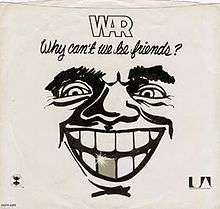Why Can't We Be Friends? (song)
"Why Can't We Be Friends?" is a song by the funk band War for its 1975 studio album of the same name. The song has a simple structure, with the phrase "Why can't we be friends?" being sung four times after each two-line verse amounting to over forty times in under four minutes. The song reached #6 on the Billboard Hot 100 in the summer of 1975. The song is unique as various members of the band exchange vocal duties from verse to verse. It was played in outer space when NASA beamed it to the linking of Soviet cosmonauts and U.S. astronauts for the Apollo–Soyuz Test Project.[1] Billboard ranked it as the No. 23 song of that year.
| "Why Can't We Be Friends?" | ||||
|---|---|---|---|---|
 | ||||
| Single by War | ||||
| from the album Why Can't We Be Friends? | ||||
| B-side | "In Mazatlan" | |||
| Released | April 1975 | |||
| Format | 7" | |||
| Recorded | 1974 | |||
| Genre | ||||
| Length | 3:50 | |||
| Label | United Artists | |||
| Songwriter(s) | Papa Dee Allen, Harold Ray Brown, B. B. Dickerson, Lonnie Jordan, Charles Miller, Lee Oskar, Howard E. Scott | |||
| Producer(s) | Jerry Goldstein | |||
| War singles chronology | ||||
| ||||
Chart performance
Certifications
| Region | Certification | Certified units/sales |
|---|---|---|
| United States (RIAA)[5] | Gold | 1,000,000^ |
|
*sales figures based on certification alone | ||
Smash Mouth version
| "Why Can't We Be Friends?" | ||||
|---|---|---|---|---|
.jpg) | ||||
| Single by Smash Mouth | ||||
| from the album Fush Yu Mang | ||||
| Released | April 7, 1998 | |||
| Format | CD single | |||
| Recorded | 1997 | |||
| Genre | Ska punk | |||
| Length | 4:46 (Album Version) 3:17 (Radio Edit) | |||
| Label | Interscope | |||
| Songwriter(s) | Papa Dee Allen, Harold Ray Brown, B. B. Dickerson, Lonnie Jordan, Charles Miller, Lee Oskar, Howard E. Scott | |||
| Producer(s) | Eric Valentine | |||
| Smash Mouth singles chronology | ||||
| ||||
American pop rock band Smash Mouth covered the song on its debut album Fush Yu Mang on April 7, 1998, releasing it as the band's second single and was also featured in the 1998 films BASEketball and Wild Things.[6] The song was also featured in the Friendships trailer for Mortal Kombat 11.[7]
Charts
| Chart (1998) | Peak position |
|---|---|
| Australia (ARIA)[8] | 67 |
| Iceland (Íslenski Listinn Topp 40)[9] | 19 |
| Netherlands (Single Top 100)[10] | 89 |
| New Zealand (Recorded Music NZ)[11] | 39 |
| Spain (AFYVE)[12] | 5 |
| Sweden (Sverigetopplistan)[13] | 29 |
| US Alternative Songs (Billboard)[14] | 28 |
References
- Gabriel San Roman (December 23, 2010). "WAR Is the Answer (and the Question) for Lonnie Jordan". OC Weekly. Retrieved February 5, 2013.
- "Image : RPM Weekly - Library and Archives Canada". Bac-lac.gc.ca. Retrieved October 10, 2016.
- "Top Singles – Volume 24, No. 14, December 27, 1975". RPM. Library and Archives Canada. Retrieved March 28, 2017.
- "Top 100 Hits of 1975/Top 100 Songs of 1975". Musicoutfitters.com. Retrieved October 10, 2016.
- "American single certifications – War – Why Can't We Be Friends". Recording Industry Association of America. Retrieved August 21, 2019. If necessary, click Advanced, then click Format, then select Single, then click SEARCH.
- "Music — Why Can't We Be Friends? - Single by Smash Mouth". Amazon. Retrieved March 9, 2016.
- "Mortal Kombat 11: Aftermath - Official Friendships Trailer". YouTube. Retrieved May 18, 2020.
- "The ARIA Australian Top 100 Singles Chart Week Ending 24 May 1998". ARIA. Retrieved February 4, 2016.
- "Íslenski Listinn Topp 40 (26.2 – 5.3. 1998)". Dagblaðið Vísir (in Icelandic). February 27, 1998. Retrieved October 3, 2019.
- "Dutchcharts.nl – Smash Mouth – Why Can't We Be Friends" (in Dutch). Single Top 100. Retrieved October 6, 2018.
- "Charts.nz – Smash Mouth – Why Can't We Be Friends". Top 40 Singles. Retrieved October 6, 2018.
- Salaverri, Fernando (September 2005). Sólo éxitos: año a año, 1959–2002 (1st ed.). Spain: Fundación Autor-SGAE. ISBN 84-8048-639-2.
- "Swedishcharts.com – Smash Mouth – Why Can't We Be Friends". Singles Top 100. Retrieved October 6, 2018.
- "Smash Mouth Chart History (Alternative Songs)". Billboard. Retrieved October 6, 2018.